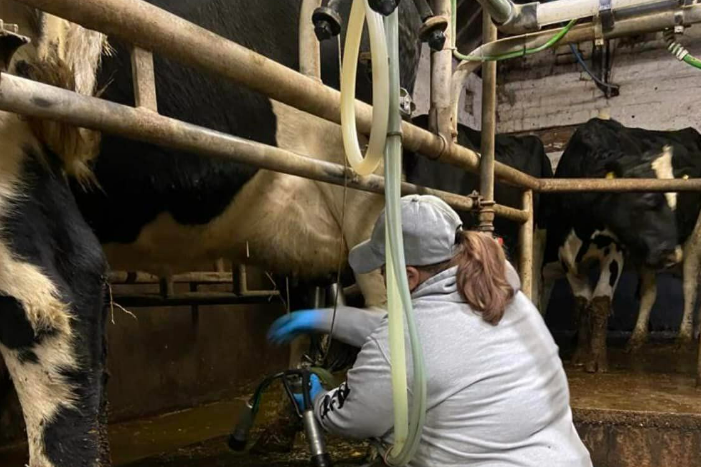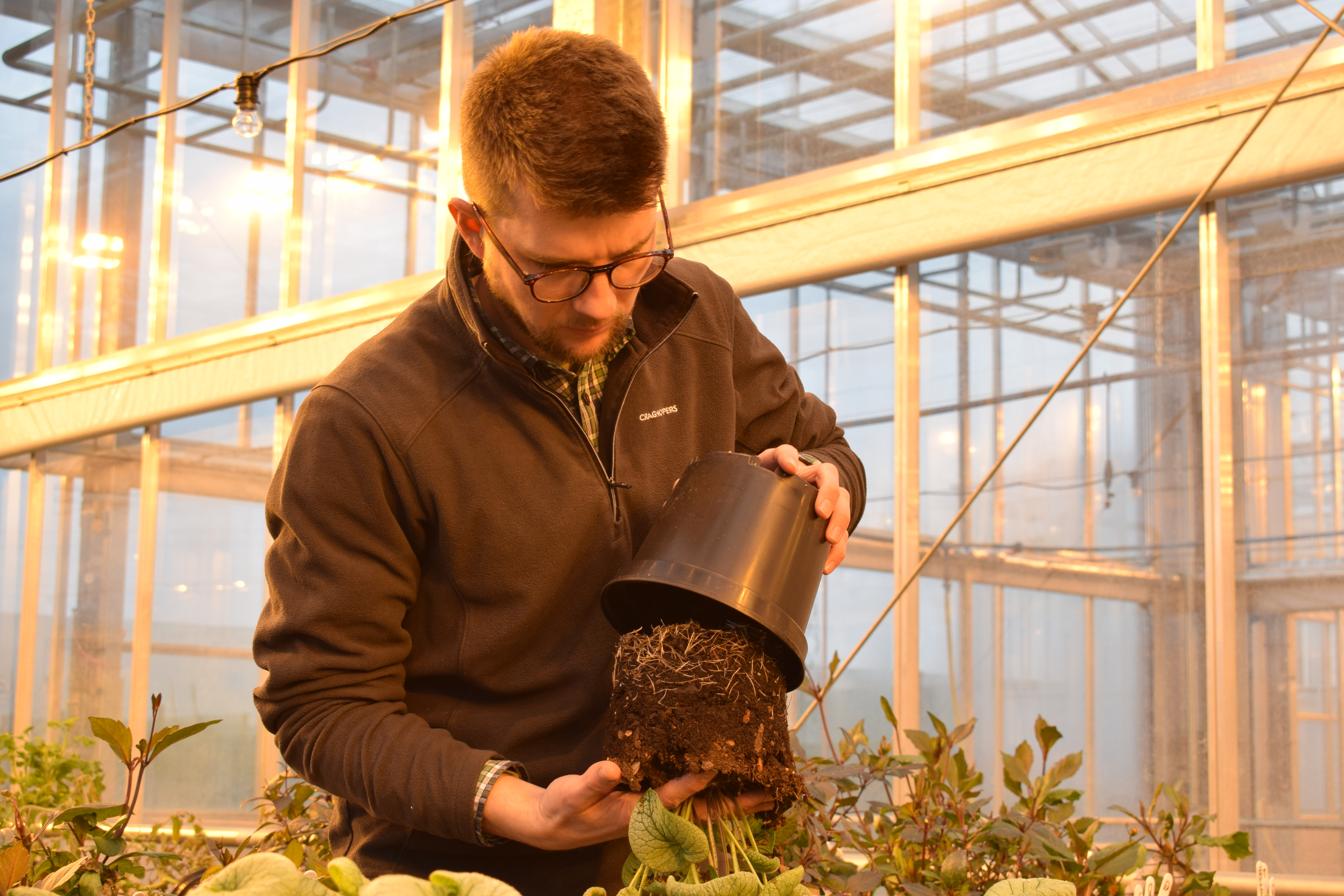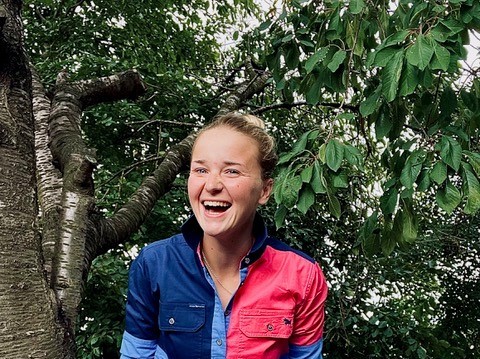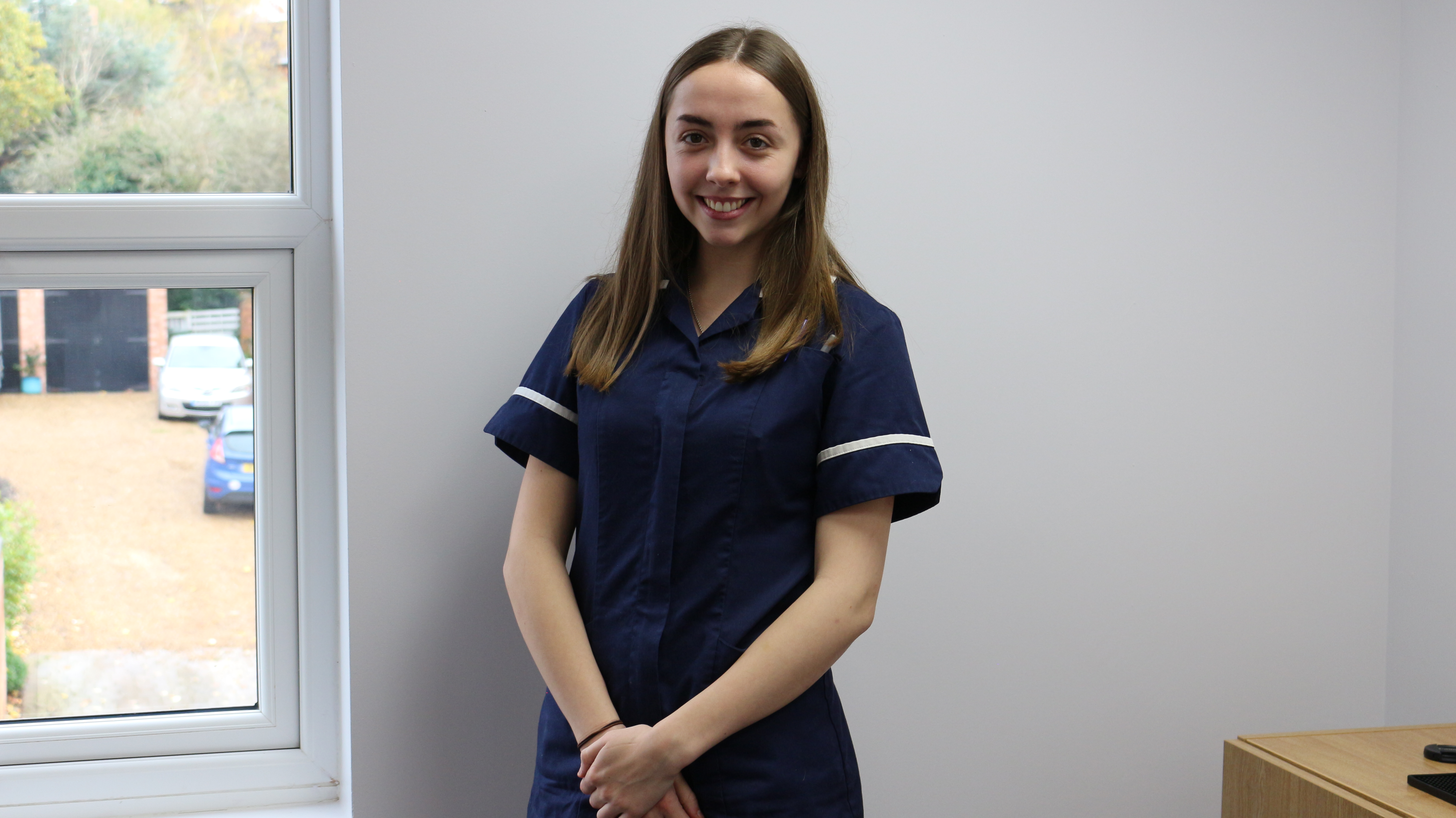

Hattie Bryett is currently in her first year at Aberystwyth university, studying Agriculture with Animal Science. She is not a generational farmer, but someone who has a strong passion for farming and experiencing all the diverse roles.
“I’m eager to learn what this industry has to offer as I am still new and experiencing all the different roles. Since I discovered my interest within Agriculture in 2016, I have worked with horses, research cattle, sheep, and dairy and beef cattle.” Over time, Hattie has focused on genetic and artificial insemination, which she hopes to learn more about during her second year at university.
Most of Hattie’s work has been within the dairy industry where she started off on a smaller scale by milking twice a day and calving all year round. “I slowly moved onto a robotic dairy farm in Aberystwyth, where I learnt more about the benefits and deficits of the dairy industry, how robots can help, and more about calving. I would ensure the cows had gone into the robots to be milked twice daily, although majority did by themselves. Also, had to ensure all sheds were clean, checked that the robots had flagged up for mastitis (an inflammation of breast tissue) and treated them depending on their severity.”
She is now employed at a research unit with fistula ex dairy cows, whilst also being an employee at McDonalds. This gives her more opportunities to learn about produce from farming. “I have worked on the research unit since March 2023 and have really enjoyed learning what research can be done with different samples from the fistula cows.” Her experience opened an interest in research within Agriculture. “I ensure that the cow’s fistulas and paddocks are cleaned daily and resolve any problems quickly. Rotating their living space from a mix of indoor and outdoor which ensures that the welfare of animals is the best that it can be.”
Since her progression at the research unit, another opportunity arose from working for this farm, and this was to get qualified and assist in the 2023 lambing season. “This was something I had never done before, so I did find it quite challenging, yet it was incredible and made me very proud. After completing a course with ‘Embryonics’ and being awarded by ‘Lantra’, I got to lead and assist in the lambing season.” Though Hattie faced many challenges on the farm, she realised her journey expanded her knowledge for the better, and the feeling of accomplishment overrides anything.
Taking on the responsibility to drive positive change, Hattie hopes to educate and inspire others to experience farming from a different light, ensuring they have that confidence and motivation to learn about Agriculture and the benefits of farming. Hattie has the capability and drive to make a difference from the ground upwards. “Agriculture offers so many roles, so I really want to experience as many pathways as possible.”
“I’m very proud to be part of this new generation of farmers. I really hope to inspire as many young people that farming is open to everyone, particularly if you are keen to put in the hard work.”
Meet Ben, a technical manager at the Park Farm Site for the National Institute of Agricultural Botany (NIAB) in Cambridge, where he has been contributing his expertise since 2017. In this Q&A session, we delve into Ben's role and journey into the field of Horticulture.
What does the business do?
NIAB is the fastest-growing crop science group in the country and is at the forefront of the application of genetics, physiology, soil science, precision agronomy and, data science to improve the yield, efficiency, and resilience of crop production across the arable, forage and horticulture sectors.
What do you do in your job each day?
As part of the wider glasshouse team, my work is primarily based in and around NIAB’s park farm glasshouse facility where we grow several different plants in our 18 environmentally controlled compartments. Crops you would typically find growing in the fields across the UK and even non-natives are grown for a range of projects. My role as Technical Manager is primarily agronomy, so working out how to grow unusual or broadacre crops under glass. My current role varies depending on the season and the projects I’m working on.
My role also includes developing commercial businesses. Having a commercial growing background allows me to work between commercial and research which helps guide new businesses with project proposals.
What courses or qualifications have you completed?
Having a commercial horticultural background, I thought I was very knowledgeable in my area, but I didn’t have any recognised qualifications in the industry. Commercial horticulture wasn’t something I trained to do, I never had a direction growing up, I just knew that I wanted to work the land, be around tractors and, drive an old Land Rover!
As my love for the industry grew and I began to see a future I knew that I needed to develop my skills and attend training courses. Having funded myself to attend pesticide application training and having trained to drive a counterbalance forklift truck, I felt my experience and training were enough for me to be desirable to other businesses and develop my career.
Since joining NIAB I have been fortunate to have had the company’s backing for several in-house and external training courses including another pesticide training course, telehandler training as well as BASIS Commercial Hort and FACTs Hort. I have also undertaken management, manual handling, and health & safety training in-house.
What skills do you use in your job?
As a grower, your primary concern is always the health of the crop. You’re always on the lookout for pests and diseases and constantly working to produce a better crop. You’re constantly asking yourself, how can I increase yield, and how can I reduce my cost, my staff inputs, and my carbon footprint. As a grower and from what I learned during my training is that, an eye for detail and continuous development lead to improved processes. Integrated Pest Management (IPM) is the perfect ideology for the grower, looking at everything, and how can I make changes and improvements to help me further down the line. Training and personal development are crucial to spotting problems in a crop. Being able to spot pest damage or early signs of disease or deficiencies is critical and understanding how to combat and prevent them leads to healthier crops.
What’s the best thing about your job?
Your focus as a commercial grower is to help build a thriving business, to make money by producing a saleable crop. Working in research, I’m able to work on projects that have a real-world impact, to assist growers improve processes and transfer research into usable skills and knowledge. Perhaps the biggest “buzz” I get is from the knowledge transfer side of our work. It’s been a long journey to acquire the knowledge I have, and that should be shared with younger growers. My aim next year is to ensure NIAB hosts at least one knowledge exchange seminar in person, aimed at the younger growers looking to develop their skills.
Have you had to deal with any challenges in your career?
I suppose career progression and diversity, were the biggest limiting factors to my professional development. Being able to attend training courses and knowledge exchange seminars wasn’t something I was presented with very often. Learning my trade in a small business allowed me to build practical skills and develop procedures, but external training would have been beneficial earlier in my career.
Is there anything you are particularly proud of?
Passing BASIS Hort, during the COVID lockdowns of 2020 was the proudest I’ve been at work. It was a long slog and wait for the results, I thought my heart was going to burst through my chest when opening the envelope from BASIS.
What parts of your job or industry are green/sustainable?
Our glasshouse facility is heated by a biomass boiler which burns wood pellets. We also use taupe-coloured plastic pots/containers, that, unlike black plastic, can be processed by local councils. NIAB also carries out growing media projects for commercial customers looking to help reduce the amount of peat used in horticulture and to reduce the number of fertilisers that are used to prevent leaching into the environment. Every process we have has some form of waste reduction associated with it.
Do you work with any technology in your role?
Every day, all day in some cases! Our glasshouse facility is controlled by a PRIVA building management system (BMS) that controls the environment of our 18 compartments. Once configured the BMS system can create Summer in the middle of winter if required. We also use a range of handheld sensors such as spectrometers, humidity sensors and, the grower's most important tool, the pH and EC meter. Using technology gives you valuable information to assist decision-making.
Ben is very happy with the position he is currently in, and he is passionate about his career. “I’d like to think I have a few years still left in me, and I have never been one to sit still, I am always looking to progress onto other things. Increasing knowledge exchange across the industry and becoming a basis approved trainer are future goals.”
We have learned from Ben to take change as a positive and explore any chances you get to progress further in your chosen career. “Don’t ever sit down and think this is all you’re good for, take a chance and change, it’s the best thing I did.”


Some may call it a double life, others may view it as living a thrilling life, yet for the world of Land-based and Environment we call it a diverse and rewarding adventure.
Splitting her time between a career as a criminal barrister and working on a family-run arable farm during the weekends, Eleanor Durdy has always had the passion to pursue both from a young age. Eleanor says she is “lucky to be born into a farming family, where my dad is a first-generation farmer, so have always had an interest in it.” She was interested in law from a young age as her grandma was a Magistrate and she grew up watching Legally Blonde. This ultimately enticed her into pursuing a legal career!
Starting off working full-time at the farm throughout school, sixth form, and university, Eleanor commenced her legal profession, reducing her farming activities to only seasonal work. After that, she went to university for her undergraduate, and master's, then completed The Bar to become a barrister. Not wanting to immediately dive into her legal career, she began working on the farm for three years until October 2020 when she started her journey as a full-time barrister.
She went on to add the importance of transferable skills, a concept used in both her career as a barrister and whilst working time on the farm. “I preach this to everyone and say to them the skills you use on a farm can be transferred to be used as a barrister. I can use my analytical skills for both when assessing and finding fair resolutions.” Eleanor has shown throughout her experiences that she is resilient, confident, and hardworking.
“Training is important - to learn from people who are already in the sector, apprenticeships are best to learn on the job.” Apprentices can train and work in a variety of aspects within the farming industry. They are broad, allowing the opportunity to develop many skills in different areas. With the right attitude, there is no loss! We either practice what we’ve gathered or understand what we need to practice.
Eleanor explains the fact that challenges can come depending on the weather as water has a crucial role in agricultural production and securing food. “When achieving success against the weather on the farm, it is the best feeling!”
She understands the importance of farmers taking some time to explore away from the farm, as it can come with quite a fair share of challenges. Nevertheless, the industry offers endless opportunities, with a range of skills development to be gained and huge satisfaction of taking long-term care of the land, green energy, and biodiversity. Securing the future of the natural environment and protecting it for future generations.
We have learned from Eleanor not to pass judgment on a career without experiencing it first! Working in farming is an opportunity to be an ecosystem engineer that feeds the nation - Making a difference from the ground upwards is something to cherish, as well as giving people the chance to experience life on a farm and to learn where our food comes from.
“Go and experience being on a farm, there is a huge misconception of how it is, yet you must try it first, shadow work is the most helpful!”
Meet Lauren Evans, who only recently started her apprenticeship at Northlands Veterinary Group. In this Q&A session we learn about her passion and commitment to become a Veterinary Nurse.
What is your name, job, and location?
My name is Lauren Evans, and I am a Veterinary Care Support for Northlands Veterinary Hospital.
How long have you been doing your apprenticeship?
I started a couple of months ago.
What or who inspired you in this career direction?
I think I have always liked animals, and this made me want to become a nurse to help a variety of animals. One person in particular, our Orthopaedic Vet Adrian, I used to watch how he is with animals and people, so polite and willing to show people how things should be done. I wanted to be just like that!
What skills are needed to pursue this line of work?
Have a lot of passion, willingness, and commitment to do anything. You must have a positive outlook on things to understand why they happened in a particular way, even if they do not end well.
What made you choose an apprenticeship?
From a young age, I have always wanted to be a Veterinary Nurse, so this was an opportunity to start from the bottom and work my way up. You can gain more knowledge as you go through each stage, instead of jumping straight in, which can be quite daunting.
Being able to learn on the job allows you to engage more and, because you are physically doing the work, you can ask as many questions as possible and double-check if knowledge is accurate.
What are the main aspects of your day-to-day job?
Being involved in the clinical side of things and finding out the root cause of issues with the animals.
What’s the most enjoyable part of your job?
Just being with the animals and how practical it is to work and learn at the same time! The apprenticeship route is more beneficial, and you can learn at a faster pace.
What are your future goals?
Once I am qualified, I will go on to referrals or maybe work in a larger hospital. I may even go into something more specific, such as learning more about the heart.
How would you sum up your job in three words?
Keep trying and pursue your goal! Even if you think things will get in the way, don’t stop and you will get there!
